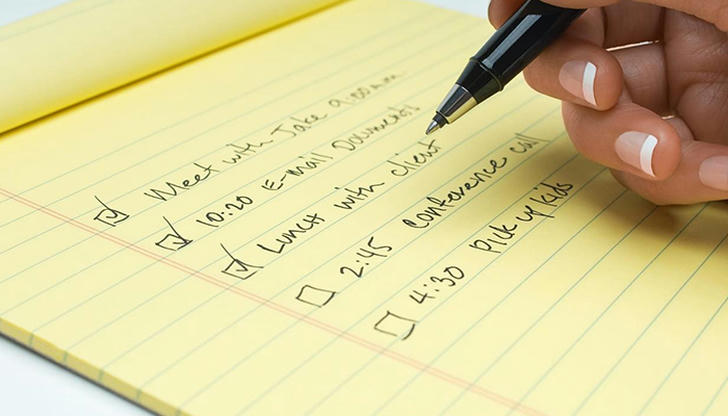10 Methods to Effortlessly Boost Your Work Efficiency
We all aspire to be more productive in certain aspects of our lives:
Perhaps you're an aspiring novelist, aiming to maintain a consistent writing habit, churning out a few hundred words each morning.
Maybe you're venturing into entrepreneurship, striving to carve out time consistently for strategic planning from start to finish.
Or, you might desire to curb procrastination in your daily work, allowing you to wrap up earlier and spend more time with your loved ones.
Unfortunately, the most common methods to enhance productivity often involve some form of being tougher on oneself, leading to various forms of self-criticism and negative self-talk. While these activities may initially fuel you with motivation, in the long run, they can drag down your efficiency and, more often than not, leave you feeling less fulfilled.
In this article, I'll share 10 simple strategies to boost efficiency in the work you love.
1. Write Down One Thing to Accomplish the Next Day

One of the primary reasons for procrastination is often not knowing what we should be doing. As a new day begins, you're likely to be faced with numerous urgent or important tasks, leaving you feeling scattered and unable to focus. Consequently, you may appear busy but make little progress on what truly matters.
To combat this, take five minutes before leaving work the day before to ponder this question:
What one thing must I accomplish tomorrow for it to be a successful day?
After giving this question serious thought, jot down the answer on a sticky note and place it somewhere visible on your desk. Next, consider the time slot during which you'll tackle this task and update your calendar accordingly. With everything laid out clearly, you'll be set up for success.
2. Working in Unfamiliar Places

Novelty is often maligned for its impact on productivity. People often cite the "Shiny Object Syndrome," where individuals become easily distracted by new and shiny things or struggle to stay focused on important tasks due to boredom.
While it's true that constantly chasing new types of work can make it challenging to maintain focus and efficiency, it doesn't mean that novelty in general is a bad thing. One of the best ways to maintain efficiency is to incorporate some novelty while keeping the work content consistent. For example:
So, instead of leaving the office at 1:00 PM having only completed 20% of the report, you might go to your favorite coffee shop to finish it in a new environment. Working in unfamiliar environments is a powerful "reset" method that can help reduce unproductive procrastination and feelings of boredom.
3. Adjusting Your Efficiency Expectations

Expectations can be a powerful factor driving progress in your work, but they can also become oppressive burdens that prevent you from accomplishing important tasks. In response, an effective approach is to regularly review and adjust your efficiency expectations.
Specifically, start by clarifying your most important efficiency goals. Then, take a few minutes to write down your expectations for achieving these goals. Next, consider your current situation and any constraints you're facing, and ask yourself: realistically, can your current circumstances allow you to achieve these efficiency goals?
If not, then it's time to adjust your expectations. For instance, if your previous goal was to "write 500 words every morning," you could tailor it to "complete several writing sessions per week, each lasting 30 minutes."
There's nothing wrong with setting strict expectations for yourself, but flexibility is key. Your job is to regularly review your expectations and make adjustments as necessary.
4. Learning to Truly Self-Care

If you don't take care of yourself properly, all your efforts may ultimately be in vain. Your ability to maintain a high level of efficiency depends on self-care. It's important to cultivate good habits and routines to keep yourself energized at all times. For example, you should:
•Maintain a healthy diet and sleep routine.
•Exercise regularly or engage in physical activities.
•Spend quality time with friends.
•Make time to relax and enjoy the present moment.
These may seem like simple things, but practicing self-care enables you to naturally stay productive, without having to delve into complex efficiency frameworks or delve into time management techniques.
5. Avoid Overthinking Goals: Set Them and Forget Them

A common trap in efficiency thinking is to dwell on our goals rather than working towards them. Many of us set goals for ourselves, which can bring us joy and excitement. However, because goals can be so satisfying, we often bask in the pleasure they bring even before we achieve them. But there's another side to them.
While it's tempting to believe that goals are helpful, in reality, they can serve as a form of procrastination. My advice? Set your goals and then forget about them.
Certainly, it's important to spend time carefully considering what you truly want to achieve, especially goals that align with your values and are meaningful within your current reality and capabilities.
However, once your goals are set, forget about them. Instead, focus your time and energy on the actions needed to achieve those goals and the entire process involved.
6. Surround Yourself with Helpful People

The late renowned American entrepreneur Jim Rohn once said: "You are the average of the five people you spend the most time with." While we might question the exact number, the underlying idea in this statement is incredibly useful, and it's something we often overlook.
If your colleagues consistently exhibit a proactive and energetic work ethic, you might find yourself adopting a similar approach, even pushing yourself to maintain that pace when you should be taking breaks. Conversely, if your colleagues maintain a healthy work-life balance and refrain from bombarding you with work emails late at night or on weekends, you'll likely experience less work-related stress.
While it's not easy to change the behavior of those around us, it doesn't change the fact that they still wield significant influence. What's more important is recognizing the implications behind this idea, rather than pretending that others can't (or shouldn't) affect us.
In light of this, even if you can't distance yourself from those with negative influences, you can still seek out more positively impactful individuals. Remember, birds of a feather flock together.
7. Cultivate the Habit of Celebrating Success

Another common productivity pitfall is the failure to take time to celebrate successes. Many of us are trained problem solvers, meaning once we complete a task, we immediately move on to the next challenge.
While this can be productive, if we don't take time to celebrate and enjoy our successes, we deprive ourselves of the pride and satisfaction that come with achievement, which are significant sources of motivation.
Pride may not always be seen as positive, but it's a valid and effective emotion, a natural expression of our accomplishments. It can inspire and drive us to continue meaningful pursuits.
8. Clarifying the Value Behind Your Work

For those of us who frequently lose focus, procrastinate, and struggle to stay productive, there are two common underlying reasons: doing the wrong things and lacking motivation.
When you're doing something truly important and understand why it matters to you, motivation issues are essentially non-existent.
If you struggle to stay productive, it's likely because the work you're doing doesn't feel meaningful or important to you, or its significance is too vague and abstract, leaving you unclear about its specifics.
In either case, the solution lies in clarifying the value behind your work. To do this, you need to sincerely answer the question: Why is this work so important to me? The more authentically and specifically you can answer this question, the more motivation you'll have to complete the task (or abandon it for something more important).
9. Energy Optimization

Whether on a daily, weekly, or monthly basis, we face numerous decision points where we need to consider what work to prioritize.
One common issue with these decision dilemmas is that if you find yourself constantly in a cycle of deliberation, you end up spending all your time and energy deciding what to do and rarely have the time to actually do it.
This decision-making process is sometimes referred to as "meta-work." While this meta-work is unavoidable and often important, too much of it can hinder our productivity or lead to procrastination.
Instead of focusing on what needs to be done, try asking yourself: What tasks will enhance my personal energy rather than deplete it? Of course, there may be occasions when we have to engage in tasks that drain our energy. However, by starting with activities that boost energy, you'll be better equipped to tackle tasks that require more effort with minimal distractions or procrastination.
10. Create Inspiration Instead of Waiting for It

American writer Madeleine L'Engle once said, "Inspiration usually comes during work, rather than before it." What's most admirable about this statement is that it encapsulates one of the most crucial points in human psychology: motivation drives behavior, and behavior also drives motivation. When it comes to motivation and behavior, most people perceive it as a one-way street—I must have motivation first to do good work.
Once you start doing meaningful work, you'll generate motivation, making it easier to keep going.
Therefore, think of the path between motivation and behavior as a two-way street. Use motivation when you have it, but don't rely on it. Instead, learn to start working, and motivation will naturally follow through the process of working.
